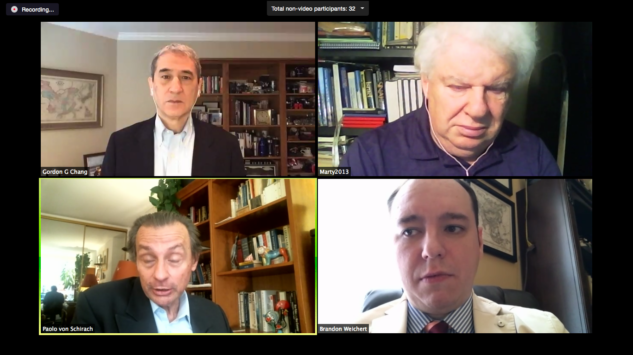Events

COVID-19 Online Event Series – III: US China Relations After Covid: From Cool to Frosty?
Increased Tension in US China Relations
On May 8th the Global Policy Institute and Bay Atlantic University held an online panel discussion titled:
“US China Relations After Covid: From Cool to Frosty?”
US China relations are troubled. In 2018 the US Government engaged in tough trade negotiations with Beijing, which included a painful tariff war. There are doubts raised elsewhere about China’s willingness to comply with a rules-based international trade system. And now the coronavirus crisis highlighted the significant level of dependence on Chinese made strategic goods. Are these manageable issues that can be resolved? Or are we witnessing the beginning of a more profound rift? What is next on the agenda?
All panelists agreed that bilateral relations have worsened in 2020. Indeed, Beijing’s lack of transparency in sharing in a timely manner all available information on the emerging coronavirus epidemic which started in Wuhan reinforced a feeling of mistrust. Gordon Chang argued that it may be possible for Washington to create a coalition of western and western oriented countries willing to reinforce trade and investment links with one another in order to lessen dependence on China based global supply chains. Brandon Weichert pointed out that, whatever the actual strength of the Chinese economy, Chinese geopolitical ambitions should be taken seriously. The West should monitor all Chinese efforts aimed at increasing its military presence in Asia and beyond. America should create stronger security ties with Indo-Pacific countries that share Washington’s concerns about China’s expansionist goals. Martin Sieff pointed out that China has major unresolved domestic problems starting with major environmental degradation. All this will absorb more energies and resources in the years to come. Gordon Chang noted that while the Belt and Road initiative will not work out as planned, Chinese ambitions in high tech should be taken seriously, given China’s real capabilities in this sector. In the end, all three panelists agreed that this marked deterioration in the bilateral US China relationship cannot be quickly fixed.
Watch the full video here.
Panelists
Brandon J. Weichert is a geopolitical analyst who manages The Weichert Report. He is a contributing editor at American Greatness and a contributor at The American Spectator. His writings on national security have appeared in Real Clear Politics and he has been featured on the BBC and CBS News. Mr. Weichert’s new book Winning Space: How America Remains a Superpower is coming out on July 20, 2020.
Gordon G. Chang is a prolific author and frequent lecturer and TV commentator on US China relations. He is the Author of “The Coming Collapse of China”.
He lived and worked in China and Hong Kong for almost two decades. His writings on China and North Korea have appeared in The New York Times, The Wall Street Journal, The National Interest, The American Conservative, the International Herald Tribune, Commentary, National Review, and Barron’s. He also writes for The Daily Beast.
Martin Sieff is a seasoned international affairs author and commentator. He is now working as the Senior Fellow at the American University in Moscow
He served as Managing Editor, International Affairs, Chief News Analyst, Defense Industry Editor, and Chief Political Correspondent at United Press International (UPI) from 1999 to 2009. He was Chief Foreign Correspondent for The Washington Times as its Soviet and East European correspondent covering the collapse of communism from 1986 to 1992, and then its State Department correspondent from 1992 to 1999.
Moderator
Paolo von Schirach, GPI President, and Chair Political Science and International Relations, Bay Atlantic University